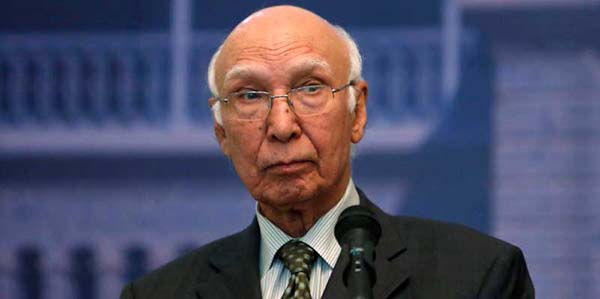ISLAMABAD - Taliban insurgents have killed scores of people in suicide and other bombings in Afghanistan during the past few days.
The violence has picked up particularly since the disclosure two weeks ago of the death of Mullah Mohammed Omar, the longstanding leader of the Islamist insurgents.
Pakistan said the spike in deadly terrorist attacks across Afghanistan, which Islamabad condemns, underscores the need for peace talks between the Afghan government and the Taliban.
Afghans are once again pointing fingers at Pakistan, alleging their neighbor is not preventing the Taliban from using its territory for staging the attacks.
Islamabad denies accusation
Pakistan's national security adviser, Sartaj Aziz, has dismissed those charges, saying there are “all kinds of (militant) factions” operating in Afghanistan making it difficult to ascertain who is behind the bloodshed.
“We very much condemn all the terrorist attacks in Kabul and other parts of Afghanistan and we have constantly worked with the Afghan government to try to restrict movements across the borders so that no terrorist goes from here to commit any act there,” Aziz said.
Pakistan brokered and hosted inaugural talks between the Afghan government and Taliban officials in early July, but Mullah Omar’s death prompted the insurgent group to pull out of the next round of negotiations.
Aziz said Pakistan can persuade the Taliban to re-engage in talks with the Afghan government only after the group resolves its leadership problem.
“We have been of course urging the Taliban to talk rather than fight because ultimately fighting is not a solution," Aziz said.
"I think the first round was very productive and I hope the second round will take place before long once the leadership issue is decided because whom they represent it is not yet clear whether there will be unanimity on the new leadership or not," he added.
Taliban internal disputes
The Taliban was quick to announce Mullah Akhtar Mansoor, deputy to Mullah Omar, as its new leader. But the move has triggered rifts and senior leaders have questioned the legitimacy of Mansoor.
The beleaguered new leader has vowed to continue the insurgency.
Senior Pakistani security officials told VOA Sunday that despite attempts by “spoilers and detractors” in Afghanistan to hamper improved bilateral cooperation, leaders in both countries remain closely engaged to further the reconciliation process.
Pakistan is working with “outmost sincerity” and is “positive” about the future of Afghan peace talks, the officials insisted, requesting anonymity.
They went on to say that Afghan President Ashraf Ghani’s discussions with Pakistan’s military chief, General Raheel Sharif, following the disclosure of Mullah Omar’s death, were “extremely positive” and both sides “remain on course.
Washington reaction
General John Campbell, U.S. commander of NATO’s Afghan Resolute Support Mission, speaking in Washington last week also praised Pakistan’s role in promoting peace in Afghanistan.
Campbell said Pakistan's military chief and Afghan leaders appear determined to further cement bilateral counterterrorism cooperation and promote regional stability.
“I think you are going to see a concerted effort by Pakistan to continue to drive the Taliban to the peace table to really drive down the violence level over the next couple of months," Campbell said.
"President Ghani has been very, very strong with General Raheel on giving him certain edicts out there to decide you need to do this to show us that you really mean what you say this time," he added.
The U.S. general, however, agreed with the widespread perception that “fracturing” inside the Taliban following the death of its spiritual leader may hamper efforts aimed at brining them to the peace table for talks with the Ghani government and it could also intensify violence in Afghanistan. (VoA)

